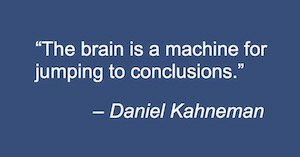OCD is Fake News

...Another way to conceptualize OCD is to see it as a three-step process of over-reacting to thoughts that are not particularly important or meaningful.
Step one in this process is to over-attend to one’s thoughts. People with OCD tend to pay way too much attention to their thoughts, going so far as to actively monitor their thinking in an effort to see if their unwanted thoughts are still present, and whether or not those thoughts continue to upset them. Conversely, people without OCD spend virtually no time at all analyzing their thoughts or their reactions to those thoughts.
Step two is to over-value one’s thoughts. This is where System 1 thinking rears its ugly head. Those struggling with OCD assign meaning and import to what are arguably meaningless, unimportant thoughts. Everybody thinks crazy stuff, but people without OCD laugh off the weird things that pass through their minds, while those with OCD often take their weird thoughts very seriously. Remember, OCD is fake news, and deserves to be valued as such.
Step three is to over-respond to one’s thoughts. This is the “compulsive” part of OCD, where the pleasure principle comes into play. The sufferer takes action to reduce or eliminate the discomfort that arises in response to their unwanted thoughts. This action commonly occurs in any of four ways:
Overt Compulsions. A physical action done in an attempt to feel less anxious, such as hand washing, or checking locks or stove burners.
Avoidance Compulsions, wherein the sufferer attempts to avoid situations in which they anticipate unwanted thoughts (and anxiety) might arise.
Reassurance Seeking Compulsions. For example, asking others to confirm that you did not run over a pedestrian, or molest a child, or commit a terrible sin.
Mental Compulsions. For example, repeatedly reviewing a past event in your mind, compulsively fretting about something you fear you may do in the future, purposely calling up a “bad” thought to check if it still causes you distress, or compulsively praying in an attempt to eliminate an unwanted thought.
If done in an effort to control one’s thinking, all of these compulsive behaviors will consistently backfire by reinforcing the importance of the thoughts, causing OCD to worsen rather than improve...

...Another way to conceptualize OCD is to see it as a three-step process of over-reacting to thoughts that are not particularly important or meaningful.
Step one in this process is to over-attend to one’s thoughts. People with OCD tend to pay way too much attention to their thoughts, going so far as to actively monitor their thinking in an effort to see if their unwanted thoughts are still present, and whether or not those thoughts continue to upset them. Conversely, people without OCD spend virtually no time at all analyzing their thoughts or their reactions to those thoughts.
Step two is to over-value one’s thoughts. This is where System 1 thinking rears its ugly head. Those struggling with OCD assign meaning and import to what are arguably meaningless, unimportant thoughts. Everybody thinks crazy stuff, but people without OCD laugh off the weird things that pass through their minds, while those with OCD often take their weird thoughts very seriously. Remember, OCD is fake news, and deserves to be valued as such.
Step three is to over-respond to one’s thoughts. This is the “compulsive” part of OCD, where the pleasure principle comes into play. The sufferer takes action to reduce or eliminate the discomfort that arises in response to their unwanted thoughts. This action commonly occurs in any of four ways:
Overt Compulsions. A physical action done in an attempt to feel less anxious, such as hand washing, or checking locks or stove burners.
Avoidance Compulsions, wherein the sufferer attempts to avoid situations in which they anticipate unwanted thoughts (and anxiety) might arise.
Reassurance Seeking Compulsions. For example, asking others to confirm that you did not run over a pedestrian, or molest a child, or commit a terrible sin.
Mental Compulsions. For example, repeatedly reviewing a past event in your mind, compulsively fretting about something you fear you may do in the future, purposely calling up a “bad” thought to check if it still causes you distress, or compulsively praying in an attempt to eliminate an unwanted thought.
If done in an effort to control one’s thinking, all of these compulsive behaviors will consistently backfire by reinforcing the importance of the thoughts, causing OCD to worsen rather than improve...
